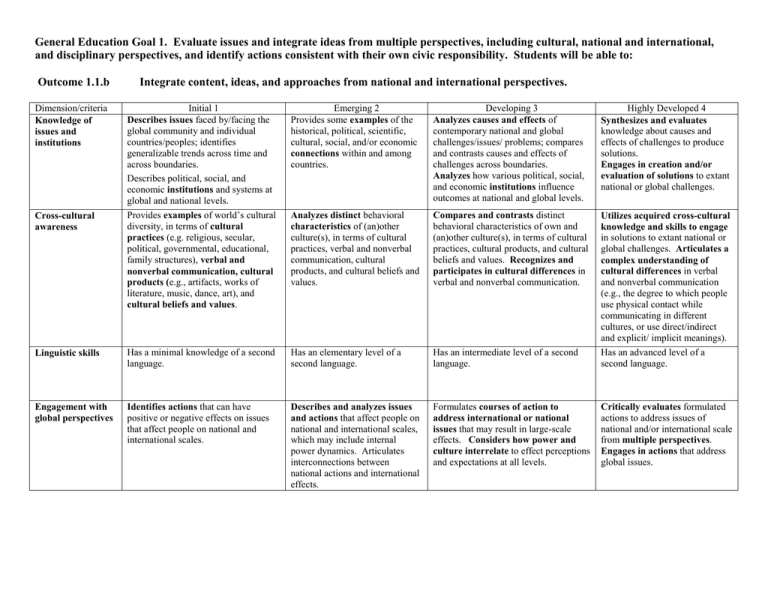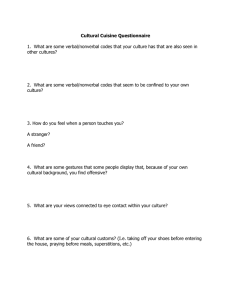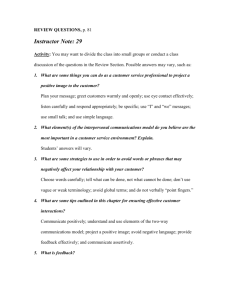Document 17739880
advertisement

General Education Goal 1. Evaluate issues and integrate ideas from multiple perspectives, including cultural, national and international, and disciplinary perspectives, and identify actions consistent with their own civic responsibility. Students will be able to: Outcome 1.1.b Integrate content, ideas, and approaches from national and international perspectives. Dimension/criteria Knowledge of issues and institutions Initial 1 Describes issues faced by/facing the global community and individual countries/peoples; identifies generalizable trends across time and across boundaries. Describes political, social, and economic institutions and systems at global and national levels. Emerging 2 Provides some examples of the historical, political, scientific, cultural, social, and/or economic connections within and among countries. Developing 3 Analyzes causes and effects of contemporary national and global challenges/issues/ problems; compares and contrasts causes and effects of challenges across boundaries. Analyzes how various political, social, and economic institutions influence outcomes at national and global levels. Highly Developed 4 Synthesizes and evaluates knowledge about causes and effects of challenges to produce solutions. Engages in creation and/or evaluation of solutions to extant national or global challenges. Cross-cultural awareness Provides examples of world’s cultural diversity, in terms of cultural practices (e.g. religious, secular, political, governmental, educational, family structures), verbal and nonverbal communication, cultural products (e.g., artifacts, works of literature, music, dance, art), and cultural beliefs and values. Analyzes distinct behavioral characteristics of (an)other culture(s), in terms of cultural practices, verbal and nonverbal communication, cultural products, and cultural beliefs and values. Compares and contrasts distinct behavioral characteristics of own and (an)other culture(s), in terms of cultural practices, cultural products, and cultural beliefs and values. Recognizes and participates in cultural differences in verbal and nonverbal communication. Utilizes acquired cross-cultural knowledge and skills to engage in solutions to extant national or global challenges. Articulates a complex understanding of cultural differences in verbal and nonverbal communication (e.g., the degree to which people use physical contact while communicating in different cultures, or use direct/indirect and explicit/ implicit meanings). Linguistic skills Has a minimal knowledge of a second language. Has an elementary level of a second language. Has an intermediate level of a second language. Has an advanced level of a second language. Engagement with global perspectives Identifies actions that can have positive or negative effects on issues that affect people on national and international scales. Describes and analyzes issues and actions that affect people on national and international scales, which may include internal power dynamics. Articulates interconnections between national actions and international effects. Formulates courses of action to address international or national issues that may result in large-scale effects. Considers how power and culture interrelate to effect perceptions and expectations at all levels. Critically evaluates formulated actions to address issues of national and/or international scale from multiple perspectives. Engages in actions that address global issues.

